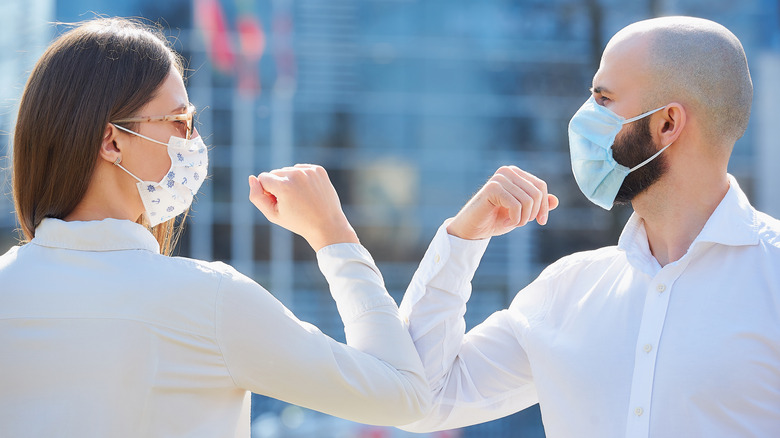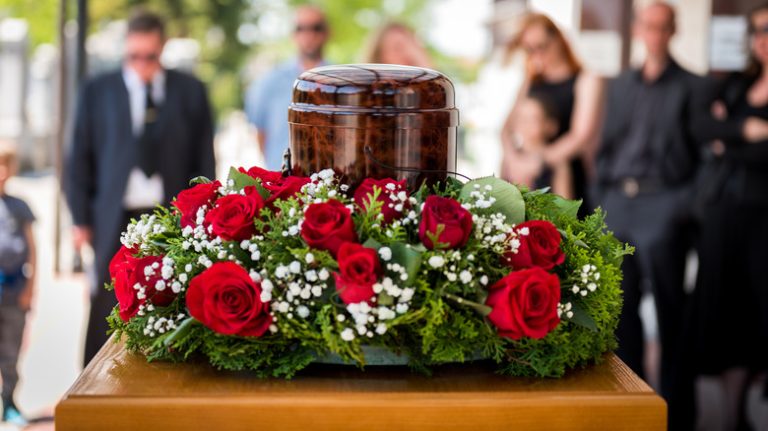Dr. Joseph Trunzo knew he wanted to study psychology by the time he was in seventh grade, but he didn’t know exactly what kind of work he wanted to do within the field. He discovered his specialty — helping people cope with the mental and emotional impacts of chronic illness — almost by accident. Trunzo heard about a study being done on the effects of psychotherapy on patients with cancer, and, as he put it, “a lightbulb went off in my head.”
Trunzo had always been fascinated by medical conditions as well as psychiatric conditions, and counseling patients with cancer seemed like the perfect marriage of his interests. He continued to work with cancer patients during his post-doctoral fellowship, and that evolved into a full-time practice focusing on patients with chronic illness.
In the age of COVID, Trunzo’s work has become more important than ever. According to UC Davis Health, studies into long COVID, the post-viral chronic illness caused by COVID-19, show that anywhere between a quarter and a third of people who get COVID will develop long COVID. They’re all discovering how hard it is to cope with suddenly losing their health and vitality.
In an exclusive interview with Health Digest, Dr. Trunzo talked about his work with long COVID patients, the methods he uses to help them cope with their illness, and the book he wrote with his best friend and long COVID survivor, Julie Luongo.
The intersection of psychology and medicine
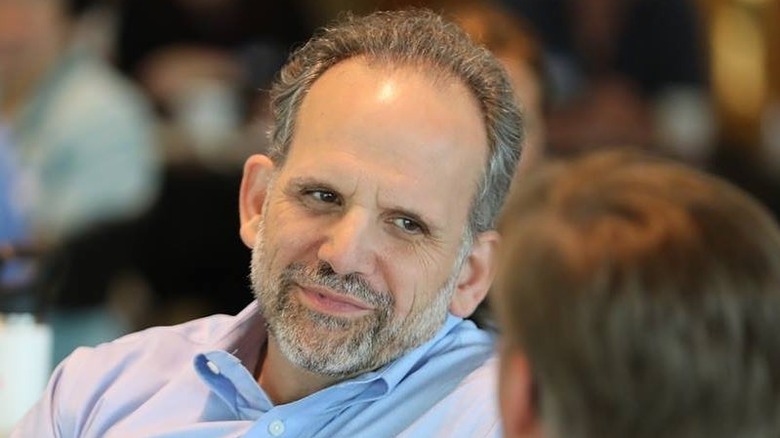
Why did you decide to pursue psychology?
Honestly, I’m a little bit weird in that regard. I actually remember asking my parents for an introduction to psychology textbook when I was in seventh grade. I tell my students this, and that’s not how it usually goes. Usually, you’re lucky if you know what you want to do by the time you get out of college, [let alone] before you even actually go in.
I’ve always been fascinated by human behavior and the brain, and I like helping people. People seem to feel comfortable telling me things, so it all fell into place. I’m lucky in that … As I was getting into psychology, I honestly did not even have any real idea of what psychology was all about. But as I moved through my education and progressed through all of that, I liked everything that I was doing, so I was able to stay on track.
What made you choose to focus on psychological management of chronic illnesses? That’s really specific.
When I was looking for graduate programs in clinical psychology, I had already worked a lot in areas of what you would call “regular mental health.” I had worked in an inpatient psychiatric facility and community mental health. I had done case management. I had done county-based work. I’d worked in all different areas of behavioral health and mental health, all of which I liked, but in addition to human behavior, I’m also interested in health and medicine and medical conditions. When I learned about those things as an undergrad and I would read about them, I was always really drawn in.
When I found a graduate program where there was a big research study going on there having to do with doing psychotherapy with cancer patients, a lightbulb went off in my head. This [seemed] like a cool way to satisfy my intersection of helping people in human behavior, but also learning a lot about medicine and various medical conditions. I’m fascinated by all that stuff. I didn’t want to go to medical school, but I like being involved in interacting in health and healthcare.
Focusing on people … I’ve done work with people who’ve had acute illnesses, and I’ve done hospital-based training. My post-doctoral training and things just get narrower. I had an opportunity to continue doing that work focused on cancer patients and my post-doctoral fellowship. My research and my clinical practice continued to evolve into that from there.
The emergence of a new chronic illness

How has your work changed since the COVID-19 pandemic and this new thing we have called long COVID?
It’s changed in a couple of different ways. Obviously, it’s a lot more of this [telehealth]. It’s revolutionized teletherapy and made it possible for people to do this kind of work at a distance, which wasn’t happening much before. That has its pluses and minuses, but I would count it as mostly plus.
The overall stress of the pandemic is being acutely felt by just about everyone. Depression and anxiety and all the run-of-the-mill, normal mental health issues have all increased. Practices everywhere are busier than they have ever been. I’ve been in the field for 30-plus years. I have never seen the demand for services as high as it is right now. There’s a real pressure involved in that, so that’s hard.
For someone like me who has done work with people who have chronic illnesses, the emergence of long COVID has been really interesting, because it parallels a lot of the other work that I’ve done with other kinds of chronic illnesses. Because we don’t know a lot about this and because medicine does not have a lot of answers for people who are dealing with long COVID, the natural thing that we have to turn to in the interim before we figure all of this out is: How do people cope with long COVID? How do people cope with chronic illness?
Since I had a skill set and a protocol for things that people can do to be helpful around dealing with chronic illness, long COVID seemed a natural place to apply that. Behavioral science has been good at helping people to deal with these kinds of chronic illnesses for quite some time. While the illness is different, the coping tends to be pretty similar. So that’s where things ended up where they are at the moment.
The similarities between long COVID and other chronic illnesses

fizkes/Shutterstock
Again, we don’t know a lot about long COVID yet. Of what we do know, how is it similar to other chronic illnesses that you’ve seen in patients you’ve worked with and how is it different?
The similarities are [that] they’re pretty symptom-based. The things that people are experiencing, the most common one is excessive tiredness and fatigue, increased depression and anxiety … Whether that’s because they’re feeling so crappy and their life has turned upside down because of that, or because the illness itself is driving some kind of organic process of depression and anxiety from cellular dysfunction, who knows? We don’t know the answers to those questions.
[There’s] brain fog, which is apparently what I’m having right now. [laughs] There’s cognitive difficulties; people not being able, as they put it, to think clearly — they don’t feel as sharp as they used to. They can’t handle a lot of executive functioning, or more complex problem-solving things that used to be really easy for them, they’re not able to do.
Then, all kinds of bodily symptoms tend to be different in different people. Some people might have cardiac problems. Other people might have joint pain; other people might have muscle pain. That varies and runs the gamut, and there are a lot of other chronic illnesses that have a lot of those problems.
Long COVID seems to be multisystemic. That’s problematic in that it’s affecting multiple areas of the body, which means you’re seeing multiple specialists, and you don’t know where to turn. There’s a lot of difficulty around that. I’d say that’s one of the major differences.
If you have multiple sclerosis, you go see a neurologist. If you have cardiac problems, you see a cardiologist. But with long COVID, there are no long COVID specialists. Nobody knows what the hell this is. It hasn’t been around long enough. There are quite literally few to zero answers around, “What’s the course of this going to be? Am I ever going to get better? Who do I see to help me to get better? Are there any meds?”
With multiple sclerosis, for example — as awful as that illness is, we have a pretty good sense of it. We don’t have a cure for it, but it’s like, “Well, you can take these drugs, and we try this thing. It’s this kind of MS, or this kind of MS, and you can see this specialist.” We’ve been treating this for a long time, so we have some answers — not all the answers, obviously, but some. We don’t have any answers for long COVID.
The other chronic illness that I tend to specialize in is Lyme disease. A lot of people question whether or not Lyme disease is a chronic condition, but there are people who have had that infectious disease who have not been the same for extended periods of time. Whether it’s a chronic infection or an inflammatory response to a chronic infection … I’m not an MD, so I can’t speculate on that kind of stuff, but there are people who have been suffering around and because of Lyme disease for a very long time, and also don’t often know where to turn or where to get answers or what the course of their illness is going to be. I see a lot of similarities between those two illnesses [Lyme disease and long COVID] and those two populations.
Adjusting to quality of life changes with chronic illness
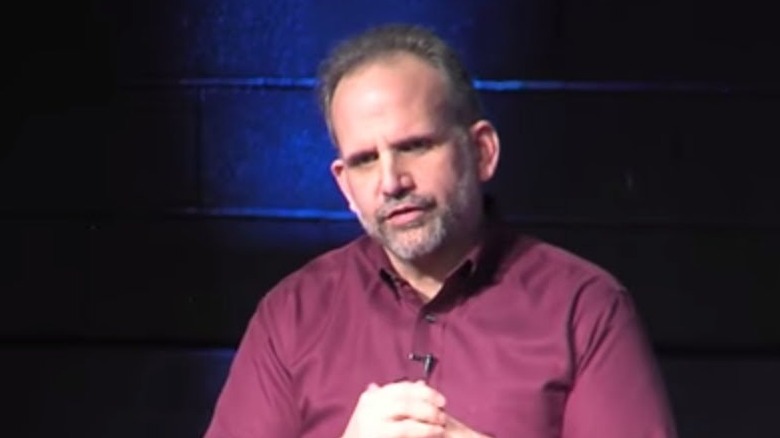
YouTube
One of the things that we’ve seen be almost unique to long COVID — although it’s not — is people who have been healthy their whole lives and then suddenly debilitated by this chronic illness. That can happen with any post-viral infection, but this is at a much larger scale. What is that like for people to go from that healthy to being sick?
It’s really hard. I see this a lot in the people with Lyme that I see, because most people who contract Lyme, they’re outdoorsy, they’re hiking, they’re very active. That’s where they’re getting the tick bites in the first place. I’ve seen many, many people [who] have been like, “I used to be really active. I would spend a lot of time outdoors. I exercised. A great career, I was really vibrant. And then, boom, it’s crashed.”
It’s a very, very difficult thing for people to deal with because it’s a major change, not just in their career and in their functioning, but it tends to change roles in their family. Somebody might have been the primary caretaker of their kids, or might have been the primary breadwinner, or there was an equal partnership in the household around that. Now, all of the sudden, one of those people in that partnership is simply not able to hold up their end anymore in the same way that they used to. That can be a very difficult dynamic in relationships, let alone things like someone’s own sense of self-worth and self-esteem and self-efficacy and all that.
Moving through those challenges can be extraordinarily difficult, never mind the practical issues that can come with that in terms of lost income and disability and things like that. It can be really devastating.
Absolutely. With the people that you’re working with right now with long COVID, how do you see them having to reshape their lives to accommodate their symptoms?
It varies. It depends on their situation. I see some people who are fortunate enough to have supportive partners who are financially stable and secure so that they’re able to take the time that they need to work through this and focus on their wellness and their recovery. But I’ve seen other people who have lost their jobs, who can’t get disability, who have ended up having to move back in with family members as adults, who are relying on and needing the support of other people in their lives in a way that they never anticipated having to do and certainly don’t want to be doing. It’s been devastatingly difficult for them.
Using acceptance and commitment therapy to cope with chronic illness
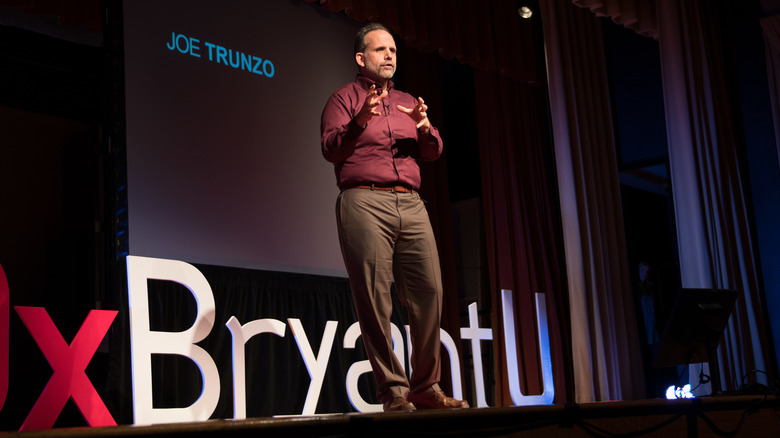
Bryant University News
One of the things that you specialize in is using acceptance and commitment therapy to cope with long-term illness. How are you using that with patients who are dealing with long COVID?
Acceptance and commitment therapy (ACT) is an approach to psychotherapy that’s focused on increasing what we refer to as “psychological flexibility.” The idea behind that is that we want to foster people’s ability to be open to whatever physical and emotional experiences they’re having in the moment. We want people to stay present – to not be stuck in the past and not be too focused on the future.
To whatever degree they can, we want people to be engaged. That means finding whatever it is that is really meaningful and important in your life — deeply, truly, fundamentally meaningful and important — and then finding some way … The way that you used to engage with that might not be available to you anymore because you’re not functioning like you used to. You might not be physically or emotionally able to engage in that value-driven behavior like you did before. But if you understand what the value is under that behavior, then you find a way to engage in that value in some way that you are able to do.
What often happens for any of us is that if we’re experiencing anything that’s unpleasant or uncomfortable, either emotionally or physically, we will exert all of our effort to try to get away from that feeling and to make that go away. When you’re able to do that, that’s fantastic. If I put my hand on a hot stove and my hand is burning, I’m going to pull my hand away, right?
But we are often faced with difficult and uncomfortable situations that we do not have that kind of control over – chronic illness being one of them. The idea here is that if you’re inflexible, and you’re trying to engage in avoidance, and you’re trying to control how you think and how you feel and what’s going on, and you’re trying to put energy into exerting that control over something that you don’t have an awful lot of control over … well, that’s wasted time and energy. Sometimes people find ways to get themselves in real trouble. A lot of times, the avoidance and the attempt to control cause more harm than what the difficulty is in the first place.
Fostering ‘psychological flexibility’

Prostock-studio/Shutterstock
Psychological flexibility teaches us to be like, “Okay, I’m dealing with this situation. I’m either having a difficult, uncomfortable thought or an uncomfortable feeling, or I’m focusing on the past or the future,” whatever it might be. It’s really about noticing and paying very close attention to what is going on with you at that moment. Then, [it’s] being open to allowing yourself to experience it and move through it and not pour all of your energy into trying to escape, avoid, control, or extinguish that, but instead putting that energy into things that are actually meaningful and beneficial to your life. If you’re spending all of your time and energy trying not to feel a particular way, it’s a lot harder to engage in value-driven behavior.
A lot of times, people will tell themselves, “Well, I’ll do X or I’ll do Y when I feel better.” When you’re dealing with a chronic illness, particularly one [where] you don’t know when it’s going to get better, you don’t know to what degree it’s going to get better, and you don’t know if it’s going to get better … If you’re continually putting your life on hold, then you are the very definition of stuck.
Psychological flexibility teaches us how to weave and navigate our way around those challenges so that we can keep moving forward in whatever way possible. It’s probably not going to be in the same way or to the same degree that you were able to do it before, but every little bit is better than no bit at all.
That’s at the heart of what acceptance and commitment therapy is about. It’s the focus of the work that I do with clients who are suffering from these kinds of illnesses. It’s a much broader therapeutic intervention than with chronic illness. This is just where I’m finding myself focusing a lot these days.
A practical guide to coping with long COVID
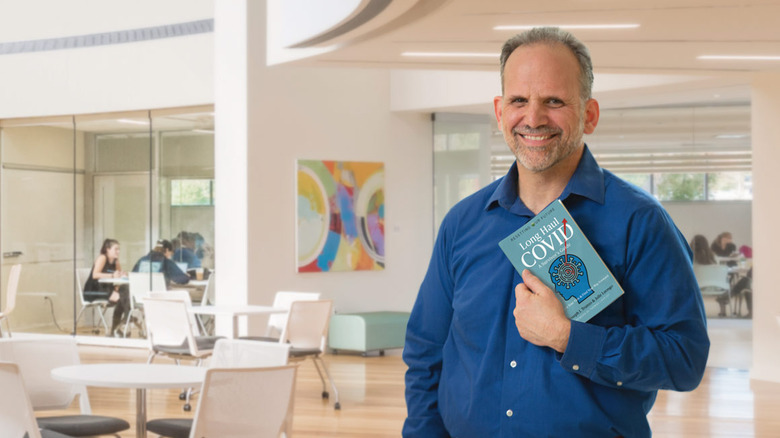
Bryant University News
You also co-authored a book about long COVID with Julie Luongo. Can you tell us a little bit about that book?
Sure. It’s interesting, because prior to that, I had written a book on using acceptance and commitment therapy to cope with Lyme disease. Julie, who is actually a very dear childhood friend of mine — we’ve known each other for 40-plus years — is a professional writer and editor. She did the initial edits on that book. She learned all about the skills, and then we published that book. It was back in 2024.
Two years later, boom — COVID hits, and then this long COVID stuff starts. Julie actually had a COVID infection back in February of ’20 before anybody knew what it was. She ended up having long COVID symptoms. These were a very long time to recover. She didn’t know what was going on, but she was sick for quite a while. She found herself using a lot of the techniques that she read about in the Lyme book.
As we learned more about COVID and long COVID, the lightbulb went off for her where she was like, “Wait a minute. I had COVID and I had long COVID, and I used these ACT approaches to help.” We have a lot of stuff in the Lyme book that we can apply to folks who are suffering from long COVID. She suggested to me that we write another book, and my editor thankfully agreed.
The big difference is [that] Julie actually co-authored this one with me. The format of the book is I go through all the science and the technique and the approach, and at the end of each one, Julie gives her example of how she used that particular technique to help her to manage her long COVID symptoms. It’s not just the voice of the psychologist in the book. It’s also the voice of a patient who suffered in the same way that a lot of people who might have long COVID are experiencing and suffering.
We’re really fortunate and thankful to be able to get that out. Big thanks to my editor and Changemakers books for agreeing to publish it.
What message are you hoping to send with the book, especially to those who are struggling with long COVID?
The primary thing is that even if you find yourself in situations that are deeply painful and uncomfortable, and that you feel like you have no control over, there are still ways to live a meaningful life and to move your life forward. Even though you feel like you’re in a very dark place, there are ways to navigate through that. That’s essentially what the book is all about. It’s a very simple, step-by-step, manageable way to help you to figure out how to live the best life you possibly can, even though you feel like hell. That’s the main thrust of what we’re trying to put out there.
What we know and don’t know about long COVID
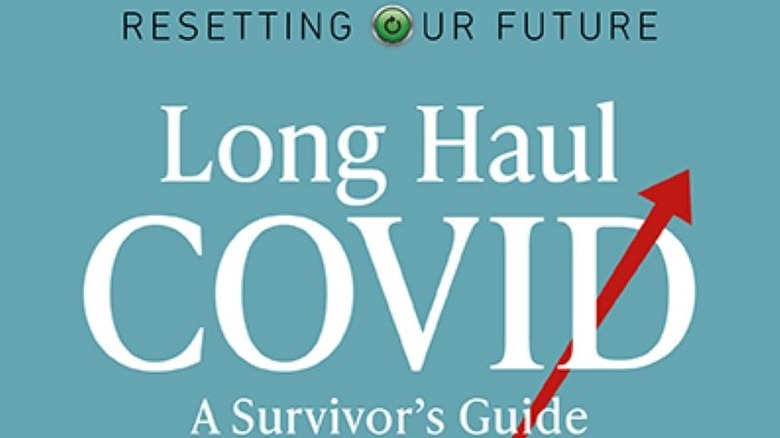
Changemaker Books
What do we still not know about long COVID? I know the list could go on forever at this point, but what are you seeing as the big gaps in our knowledge about long COVID right now?
In my decidedly non-medical opinion, while we’re getting closer to knowing what actually causes it, we don’t know. We know COVID-19 causes it, but what is it about COVID-19 that causes these long-term symptoms after the period of active infection is over? We don’t have a really good sense of cause.
We also don’t have a good sense of how long. Some people [will] have long COVID for maybe a month or two. Other people have had it for two-plus years at this point. What is it about some people where they seem to bounce back? They’re sick for 10 days, and then they’re fine. Some people are sick for 10 days and they feel crappy for another month or two, but then they’re okay. Then, there are other people who have been severely debilitated for years at this point. What are the differences that indicate or determine which categories someone falls into?
Those are really important answers that we’re going to need to find to be able to help these people medically as best as possible.
What do you want the world to know about long COVID as you’ve been working with it with patients?
Boy, that’s a good question. It’s probably close to what I said before — that even if you have long COVID, even if it’s turned your life upside down, even if you’re suffering in almost immeasurable ways, there are ways to live better and to navigate that pain and that difficulty in a way that feels better than what you’re feeling right now. That’s my message of hope and optimism for folks who are suffering with this.
Please Visit Changemakers Books to order your copy of “Long Haul COVID: A Survivor’s Guide” today.
This interview was edited for clarity.

